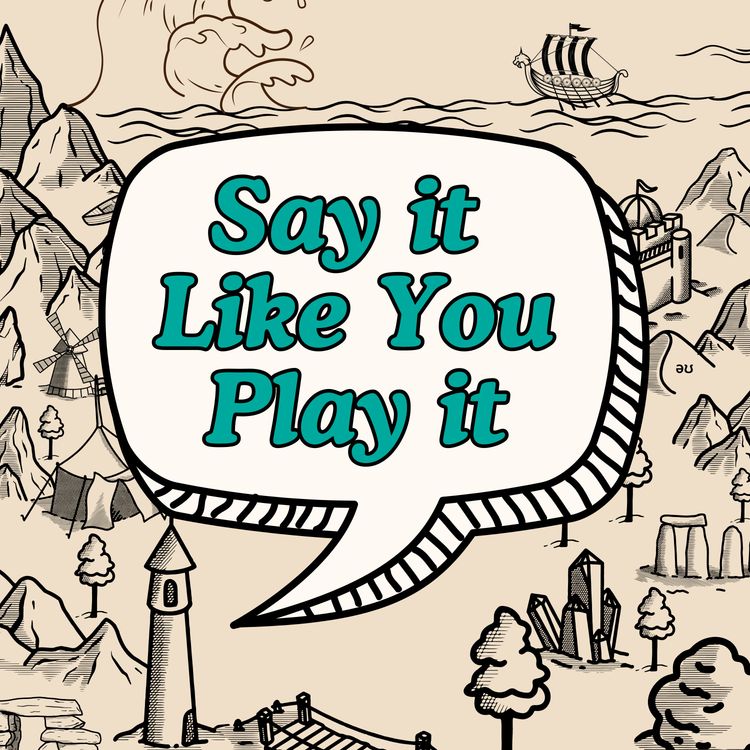Share

Say It Like You Play It
Real cultures in games: humour, accents, and how you hold your pizza
In this episode, we talk about the representation of real cultures in video games. Hosts Dr. Ibi and Dr. Joe discuss:
- The scope of ‘culture’, from architecture to penis jokes
- Nationality, regionality, mainstream, and stereotypes
- Accents and how people feel about them
- Games such as Grand Theft Auto, Assassin’s Creed, Life is Strange, Thank Goodness You’re Here, Night in the Woods.
Contains some strong (and other type types of) language.
📜 If you would like more Say It Like You Play It content, you can find our BLOG here: https://ibibaxterwebb.wordpress.com/blog-podcast/
☕ If you would like to support us, you can buy us a coffee here: buymeacoffee.com/sayitlikeyouplayit
📺 We're also on YouTube: https://www.youtube.com/@SayItLikeYouPlayIt
📚 Resources:
Bardwell, Thomas. 2020. 'Why Do the Children in Assassin’s Creed Valhalla Have American Accents?'. URL: https://www.ccn.com/why-do-the-children-in-assassins-creed-valhalla-have-american-accents/
Moser, Cassidy. 2017. 'Ubisoft Discusses the Lack of French Accents in Assassin's Creed Unity'. URL: https://www.ign.com/articles/2014/09/15/ubisoft-discusses-the-lack-of-french-accents-in-assassins-creed-unity
Spencer-Oatey, Helen. 2008. Culturally Speaking. Culture, Communication and Politeness Theory. London: Continuum.
Williams, Raymond. 1976. Keywords: A Vocabulary of Culture and Society. Oxford: Oxford University Press.
More episodes
View all episodes

12. Blue Prince: puzzles, puns, and politics
01:09:43||Ep. 12In this episode we discuss the puzzle adventure game Blue Prince by Dogubomb. Hosts Dr. Ibi and Dr. Joe cover topics including:The game's world & loreWord play in puzzles, as clues, & for funColour semioticsSign versus noise ratioThe (un)translatability of the gameSongs that are low-key about playing Blue Prince: https://open.spotify.com/playlist/6DbDTBrBK23NIV4u077vcx?si=d8ed31681e964979 Contains some strong (and other types of) language.☕ If you would like to support us, you can buy us a coffee here: buymeacoffee.com/sayitlikeyouplayit📺 We're also on YouTube: https://www.youtube.com/@SayItLikeYouPlayIt
11. Semiotics and (video) games
57:27||Ep. 11In this episode we discuss a concept which has been important – but implicit – in many previous episodes: semiotics, or meaning-making through signs. Hosts Dr. Ibi and Dr. Joe cover topics including:The linguistic foundations and broad applications of semiotics;Definitions and different types of signs;Multi-modal semiotics in (video) games;Genre-specific and genre-independent semiotics;The relationship between signs and ludemes;Examples such as UI, rarity colours, and controls; Contains some strong (and other types of) language.☕ If you would like to support us, you can buy us a coffee here: buymeacoffee.com/sayitlikeyouplayit📺 We're also on YouTube: https://www.youtube.com/@SayItLikeYouPlayItResources:Blomberg, J. 2018. 'The Semiotics of the Game Controller', Game Studies, 18(2). https://gamestudies.org/1802/articles/blomberg Chandler, D. 'Semiotics for Beginners'. https://www.cs.princeton.edu/~chazelle/courses/BIB/semio2.htm Hawreliak, J. (2018). Multimodal Semiotics and Rhetoric in Videogames. Routledge. https://doi.org/10.4324/9781315159492
10. Chants of Sennaar & Sethian reactions: what makes a good language puzzle game?
49:33||Ep. 10In this episode we talk about our experience playing two language puzzle games, 'Chants of Sennaar' by Rundisc and 'Sethian' by Duang! Games, LLC . Hosts Dr. Ibi and Dr. Joe cover topics including:language puzzle and translation mechanicsembedding conlangs in game worldsplayer versus player-character knowledge of conlangscomplexity of conlangs and how to make them decipherableContains some strong (and other types of) language.☕ If you would like to support us, you can buy us a coffee here: buymeacoffee.com/sayitlikeyouplayit📺 We're also on YouTube: https://www.youtube.com/@SayItLikeYouPlayIt
9. Language, character design, and world building
01:02:15||Ep. 9In this episode we talk about the role of language in character design and world building. Hosts Dr. Ibi and Dr. Joe cover topics including:language ideologies, stereotypes, and otheringcharacters with different accents or speech impedimentsspelling in conlangs inspired by real languagesreal-world associations mapping onto fictional worldsgames such as the Dragon Age franchise, Pillars of Eternity, Cyberpunk 2077, Disco ElysiumContains some strong (and other types of) language.☕ If you would like to support us, you can buy us a coffee here: buymeacoffee.com/sayitlikeyouplayit📺 We're also on YouTube: https://www.youtube.com/@SayItLikeYouPlayItResources:Burrell-Kim, Danielle (2023). Stuttering Matt: Linguistic ableism and the mockery of speech impediments in video games. Game Studies, 23(2). Available here: https://gamestudies.org/2302/articles/burrellkim Villanueva, Emily & Ensslin Astrid (2021). Divine intervention: Multimodal pragmatics and unconventional opposition in performed character speech in Dragon Age: Inquisition. In: Planchenault, G. & Poljak, L. (eds.) Pragmatics of Accents. John Benjamins Publishing Company, 205-228. Available here: https://bora.uib.no/bora-xmlui/bitstream/handle/11250/2993691/villanueva_ensslin_preprints.pdf?sequence=1'Constructed Languages and Intuitive *~ Culture Feels ~*', forum thread. Available here: https://forums.obsidian.net/topic/63958-constructed-languages-and-intuitive-~-culture-feels-~/
8. Hearthstone deep dive: when game studies meets linguistics
01:25:07||Ep. 8In this episode we take a close look at the online collectible card game 'Hearthstone', which is part of Blizzard Entertainment's 'Warcraft' franchise, and three research papers which study the game in relation to language and communication. Hosts Dr. Ibi and Dr. Joe cover topics including:Humour, puns, and wordplay in Hearthstone;Linguistic differences between rule texts and flavour texts;The functions and forms of keywords and card names;Localization, with a focus on the use of Kanji in Japanese;Communicative affordances and limitations of the in-game emote system;Players' perceptions of "bad manners"; Qualitative versus quantitative research approaches and the obstacles of research cultures;Contains some strong (and other types of) language.☕ If you would like to support us, you can buy us a coffee here: buymeacoffee.com/sayitlikeyouplayit📺 We're also on YouTube: https://www.youtube.com/@SayItLikeYouPlayItResources:Arjoranta, J., & Siitonen, M. (2018). Why do players misuse emotes in Hearthstone? Negotiating the use of communicative affordances in an online multiplayer game. Game Studies, 18(2). Available here: https://gamestudies.org/1802/articles/arjoranta_siitonen.Jacquin, J., & Xanthos, A. (2021). Evolution of linguistic complexity in Hearthstone: a resource and an example in linguistic game studies. Digital Scholarship in the Humanities, 36(4), 907-918. Available here: https://serval.unil.ch/resource/serval:BIB_FA8B6BCC9CA2.P001/REF.pdfRobertson, W. (2020). Unspeakable puns: kanji-dependent wordplay as a localization strategy in Japanese. Perspectives, 28(4), 606-624. DOI: https://doi.org/10.1080/0907676X.2018.1548628.'German translations messy since last update', forum thread: https://us.forums.blizzard.com/en/hearthstone/t/german-translations-messy-since-last-update/126281.
7. Gamified language learning: neither fun nor educational?
46:54||Ep. 7In this episode we discuss our experiences of using language-learning apps. Hosts Dr. Ibi and Dr. Joe cover topics including:What is gamification?Loss aversion, quizzes, and immersive learningThe (im)balance between vocabulary and grammarDifferent needs for different audiencesApps such as Duolingo, LingoLegends, Memrise, Influent, and EarthlingoContains some strong (and other types of) language.📜 If you would like more Say It Like You Play It content, you can find our BLOG here: https://ibibaxterwebb.wordpress.com/blog-podcast/☕ If you would like to support us, you can buy us a coffee here: buymeacoffee.com/sayitlikeyouplayit📺 We're also on YouTube: https://www.youtube.com/@SayItLikeYouPlayItFurther resources: Alvi, I. (2022). Gamification interaction features in language learning apps, brand engagement, and brand-consumer relationship quality. Journal of Content, Community and Communication, 15(8), 210-226. Available via: https://www.amity.edu/gwalior/jccc/pdf/june-2022-15.pdf.Shortt, M., Tilak, S., Kuznetcova, I., Martens, B., & Akinkuolie, B. (2023). Gamification in mobile-assisted language learning: A systematic review of Duolingo literature from public release of 2012 to early 2020. Computer Assisted Language Learning, 36(3), 517-554. DOI: https://doi.org/10.1080/09588221.2021.1933540.
6. 'The gostak distims the doshes': deciphering gibberish-English in a text-based adventure game
48:02||Ep. 6In this episode we discuss Carl Muckenhoupt's challenging 'The Gostak'; a text-based adventure game in which the player has to decipher a gibberish version of English. Hosts Dr. Ibi and Dr. Joe cover topics including:How the game worksTranslation as game mechanicThe syntax of English and what it tells us about the meaning of wordsVerb transitivity, direct objects, and indirect objects Thinking of nouns and verbs as building blocks of games more generally If you would like to play 'The Gostak' youself, you can do so on the Interactive Fiction DataBase: https://ifdb.org/viewgame?id=w5s3sv43s3p98v45#:~:text=The%20reference%20is%20to%20the,can%20be%20distimmed%20by%20aContains some strong (and other type types of) language.📜 If you would like more Say It Like You Play It content, you can find our BLOG here: https://ibibaxterwebb.wordpress.com/blog-podcast/☕ If you would like to support us, you can buy us a coffee here: buymeacoffee.com/sayitlikeyouplayit📺 We're also on YouTube: https://www.youtube.com/@SayItLikeYouPlayIt📚 Resources:Ingraham, A. (1903). Swain school lectures. Open Court Publishing Company. Available at: https://archive.org/details/swainschoollectu00ingruoft Ogden, C. K., & Richards, I. A. (1927). The Meaning of Meaning: A Study of the Influence of Language upon Thought and of the Science of Symbolism. Harcourt, Brace.Tenielle Fordyce-Ruff, Tenielle. ‘Beyond the Basics: Transitive, Intransitive, Ditransitive and Ambitransitive Verbs’. The Advocate, Feb. 2015, p. 54-55. Available at: https://digitalcommons.csp.edu/cgi/viewcontent.cgi?article=1015&context=lawfaculty
4. Social simulation in games: what is it and why isn’t there more of it?
57:45||Ep. 4In this episode, we talk about social simulation in games, taking as our starting point Mitu Khandaker's talk ‘Thinking about people: Designing games for social simulation’. Hosts Dr. Ibi and Dr. Joe discuss:What’s a social sim?Autonomous behaviour versus authored branching storiesSocial simulation in tabletop gamesWhat are NPCs for?The multiple functions of communication and interaction in real life and gamesGames such as The Sims, Baldur's Gate 3, Skyrim, Dragon Age, Redshirts, and Ctrl.Alt.DELContains some strong (and other type types of) language.📜 If you would like more Say It Like You Play It content, you can find our BLOG here: https://ibibaxterwebb.wordpress.com/blog-podcast/☕ If you would like to support us, you can buy us a coffee here: buymeacoffee.com/sayitlikeyouplayit📺 We're also on YouTube: https://www.youtube.com/@SayItLikeYouPlayIt📚 Resources: Jakobson, Roman. 1960. ‘Linguistics and poetics’. In T. Seboek (ed.) Style in Language, MIT Press, 350-377.Available at: https://www.academia.edu/download/33061075/Jakobson_Eks_15_F12.pdfKhandaker, Mitu. 2015 ‘Thinking about people: Designing games for social simulation’, Game Developers Conference, San Francisco.Video available at: https://www.youtube.com/watch?v=haNy1kSHMt8&t=2591s Mathiot, Madeleine & Garvin, Paul L. 1975. ‘The functions of language: A sociocultural view’, Anthropological Quarterly, 48(3). 148–156. DOI: https://doi.org/10.2307/3316921Searle, John R. 1975. ‘A taxonomy of illocutionary acts.’ In K. Gunderson (ed.) Language, Mind, and Knowledge, University of Minnesota Press, 344–369.